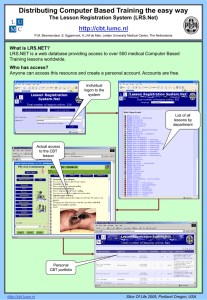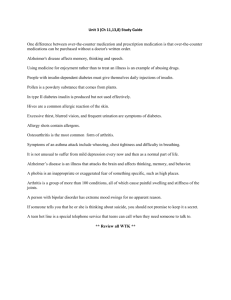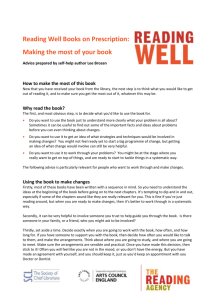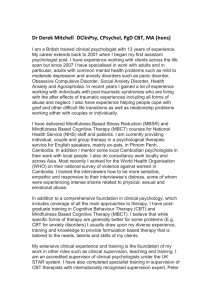Cognitive Therapy in Diabetes Care
advertisement
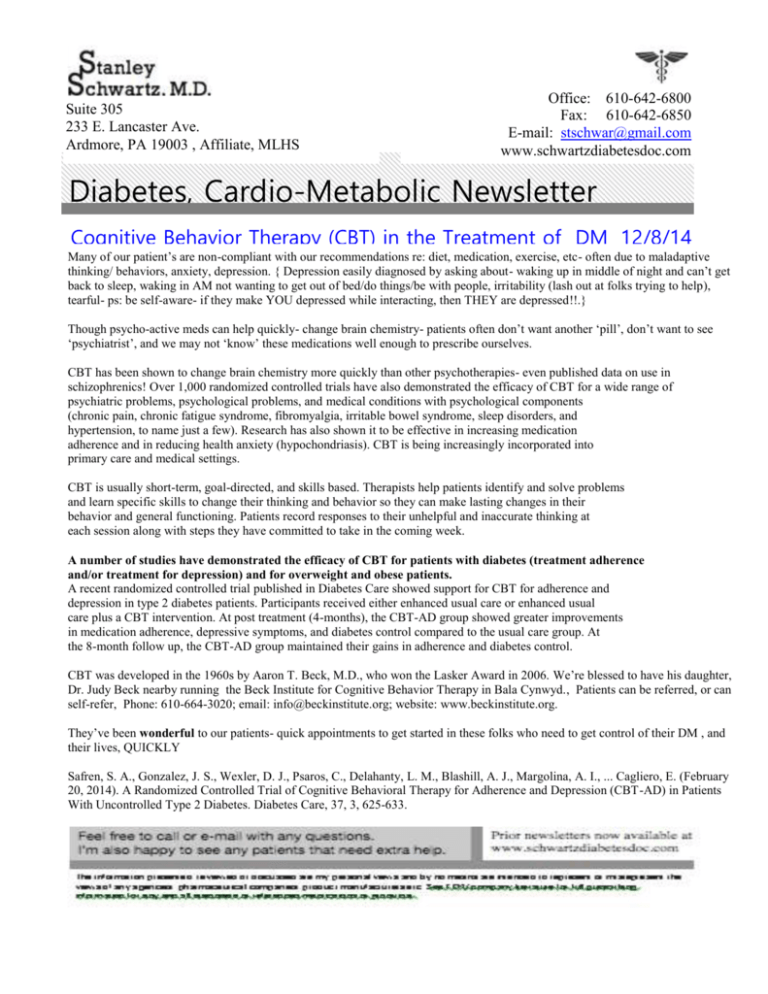
Suite 305
233 E. Lancaster Ave.
Ardmore, PA 19003 , Affiliate, MLHS
Office: 610-642-6800
Fax: 610-642-6850
E-mail: stschwar@gmail.com
www.schwartzdiabetesdoc.com
Diabetes, Cardio-Metabolic Newsletter
Cognitive Behavior Therapy (CBT) in the Treatment of DM 12/8/14
Many of our patient’s are non-compliant with our recommendations re: diet, medication, exercise, etc- often due to maladaptive
thinking/ behaviors, anxiety, depression. { Depression easily diagnosed by asking about- waking up in middle of night and can’t get
back to sleep, waking in AM not wanting to get out of bed/do things/be with people, irritability (lash out at folks trying to help),
tearful- ps: be self-aware- if they make YOU depressed while interacting, then THEY are depressed!!.}
Though psycho-active meds can help quickly- change brain chemistry- patients often don’t want another ‘pill’, don’t want to see
‘psychiatrist’, and we may not ‘know’ these medications well enough to prescribe ourselves.
CBT has been shown to change brain chemistry more quickly than other psychotherapies- even published data on use in
schizophrenics! Over 1,000 randomized controlled trials have also demonstrated the efficacy of CBT for a wide range of
psychiatric problems, psychological problems, and medical conditions with psychological components
(chronic pain, chronic fatigue syndrome, fibromyalgia, irritable bowel syndrome, sleep disorders, and
hypertension, to name just a few). Research has also shown it to be effective in increasing medication
adherence and in reducing health anxiety (hypochondriasis). CBT is being increasingly incorporated into
primary care and medical settings.
CBT is usually short-term, goal-directed, and skills based. Therapists help patients identify and solve problems
and learn specific skills to change their thinking and behavior so they can make lasting changes in their
behavior and general functioning. Patients record responses to their unhelpful and inaccurate thinking at
each session along with steps they have committed to take in the coming week.
A number of studies have demonstrated the efficacy of CBT for patients with diabetes (treatment adherence
and/or treatment for depression) and for overweight and obese patients.
A recent randomized controlled trial published in Diabetes Care showed support for CBT for adherence and
depression in type 2 diabetes patients. Participants received either enhanced usual care or enhanced usual
care plus a CBT intervention. At post treatment (4-months), the CBT-AD group showed greater improvements
in medication adherence, depressive symptoms, and diabetes control compared to the usual care group. At
the 8-month follow up, the CBT-AD group maintained their gains in adherence and diabetes control.
CBT was developed in the 1960s by Aaron T. Beck, M.D., who won the Lasker Award in 2006. We’re blessed to have his daughter,
Dr. Judy Beck nearby running the Beck Institute for Cognitive Behavior Therapy in Bala Cynwyd., Patients can be referred, or can
self-refer, Phone: 610-664-3020; email: info@beckinstitute.org; website: www.beckinstitute.org.
They’ve been wonderful to our patients- quick appointments to get started in these folks who need to get control of their DM , and
their lives, QUICKLY
Safren, S. A., Gonzalez, J. S., Wexler, D. J., Psaros, C., Delahanty, L. M., Blashill, A. J., Margolina, A. I., ... Cagliero, E. (February
20, 2014). A Randomized Controlled Trial of Cognitive Behavioral Therapy for Adherence and Depression (CBT-AD) in Patients
With Uncontrolled Type 2 Diabetes. Diabetes Care, 37, 3, 625-633.


